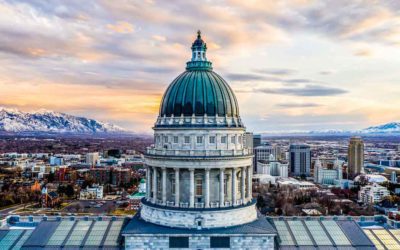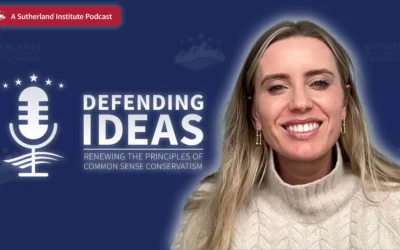
Written by Derek Monson
August 26, 2021
The past week’s news reporting on mask mandates has been a civics lesson on our system of government in Utah. Gov. Spencer Cox reportedly considered an executive order to allow local education leaders to enact mask mandates in schools despite a new law restricting school boards from enacting such mandates. An emergency declaration by the Salt Lake City mayor to require masks for K-12 students drew criticism from key legislators, who hinted at potential new laws as a result. And last but not least, a group of parents of immunocompromised children filed a lawsuit challenging the constitutionality of the new state law restricting mask mandates issued by local officials.
In short, all three branches and multiple levels of government are exerting their powers on the issue of mask mandates. That offers us one of the best civics lessons on the powers of the state and local governments as well as the three branches of government (including checks on those powers) since the Broadway musical Hamilton and Schoolhouse Rock’s “I’m Just a Bill” cartoon.
Take Cox’s idea of an executive order, for example. Earlier this year, the Utah Legislature enacted multiple new laws restricting the powers of the governor and local governments to enact things like mask mandates, including in K-12 public schools. News reporting would suggest that the Cox administration believes that it maintains legal authority, despite the new laws, to allow district public school officials to issue mask mandates in schools, at least temporarily.
This is a civics lesson in the separation of powers and the purposes of the legislative and executive branches. Writing about legislative and executive powers in American government, James Madison in Federalist Paper No. 47 argued (quoting French philosopher Montesquieu) that “when the legislative and executive powers are united in the same person or body there can be no liberty.” Hence, the legislative power to enact new laws and the executive power to execute the law are separated into different branches of government. In the current example, the Utah Legislature’s power is to enact laws like those restricting the creation of mask mandates by local governments, while the governor is empowered to execute those laws.
Writing about the executive branch in Federalist Paper No. 70, Alexander Hamilton argued that “Energy in the Executive is a leading character in the definition of good government” and that the organization of the legislature – made up of many different people of similar authority – is “best adapted to deliberation and wisdom.” So in times of pressing need or emergency, the governor is much better situated to act energetically to meet the urgency of the moment. This is seen in Cox’s consideration of an executive order to allow mask mandates in schools to meet the urgency of the growing number of COVID cases in school-age children.
The Salt Lake City mayor’s emergency order for a mask mandate in schools continues this lesson in civics. The laws restricting local government mask mandates were an exercise of the state legislature’s lawmaking power under Article VI of the state constitution. Legislators’ suggestion that they may consider new laws to further restrict city mayors’ emergency powers similarly stems from their Article VI authority. The Salt Lake City mayor’s emergency declaration was done under city authority regulated by a state law titled the Disaster Response and Recovery Act.
In other words, the Salt Lake City mayor and critical legislators both have law to justify their side of the debate over mask mandates.
The debate offers a civics lesson in the powers of state and local governments and how they operate in Utah. City government power is established by the state constitution (Article XI, Section 5) but can in many instances be overridden, regulated or restricted by the state’s constitutional legislative power. When city and state legislative powers are thought to conflict, such disputes are resolved by public debate and policymaking (e.g., the state passes a new law regulating city authority); by a lawsuit, should it come to that; and by the voice of the people when state and local elected officials come up again for re-election.
This brings us to the lawsuit filed by a group of parents of immunocompromised children over the state’s new laws restricting local government mask mandates, specifically in public schools. Plaintiffs argue that the laws unconstitutionally restrict their children’s rights to a free public education, due process and equal protection.
This lawsuit is a civics lesson on both basic constitutional rights and the judiciary’s role in disputes over legal authority between branches and levels of government. Article X, Section 1, of the state constitution establishes a right to free access to K-12 public schools for all children. Article I, Section 7, states, “No person shall be deprived of life, liberty or property, without due process of law.” When citizens believe that a state legislative or executive branch action has infringed on rights protected by the Constitution, they can appeal to the judiciary branch for relief from that alleged infringement. Courts can offer such relief – determining whether laws or regulations are unconstitutional – due to the power of judicial review established by the U.S. Supreme Court decision in Marbury v. Madison in 1803.
As the mask mandate saga attests, American civics is alive and well in Utah – even when we aren’t aware of it. The fact that these civic processes are the means by which the people can influence or change the laws that protect or restrict our freedoms and liberties is a compelling reason for restoring the civics mission of K-12 public schools. This can be accomplished through local curriculum and state academic standards reforms – in concert with policy reforms that depoliticize the classroom – that promise to re-establish a rigorous, sequential and prioritized system of civics and history education.
Whatever the next mask mandate dispute or controversy may be, it should remind us of the importance of understanding how our government works. The more we lose that understanding, the more that mask mandates and similar issues will feel like the least of our worries.
More Insights
Read More
Why is Utah at odds with Justice Department over treatment of gender-dysphoric prisoner?
Lawsuit illustrates a little-known practice of federal agencies – giving various forms of “guidance” which are not supposed to be legally binding. The practice raises serious legal and constitutional questions.
What would a parent-teacher ‘handshake’ look like in Utah?
This partnership does not allow either party to pass blame entirely to the other. There is no scapegoat, only opportunities for either party or both to work on the factors within their scope.
Restoring “The Soul of Civility” in America, with Alexandra Hudson
Most people would agree that civility seems to be in short supply in our current political environment. But in recent years, a growing chorus of voices across the political spectrum has been calling for a return to principles of civility in politics, as well as all areas of public life.


